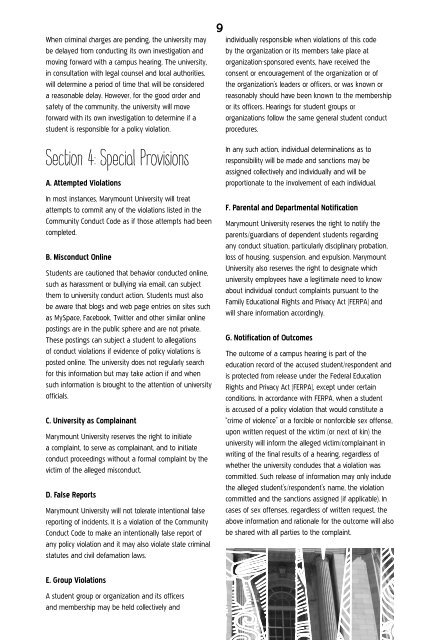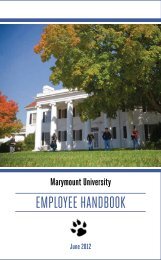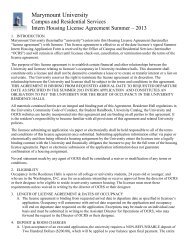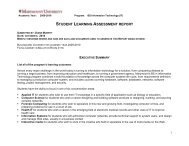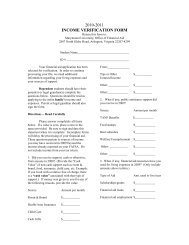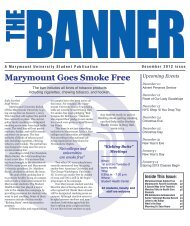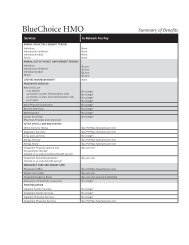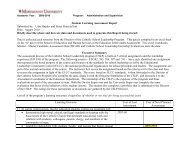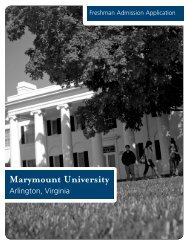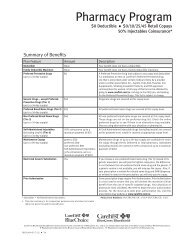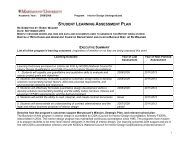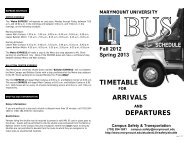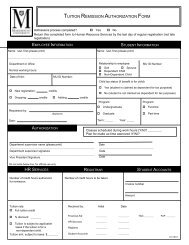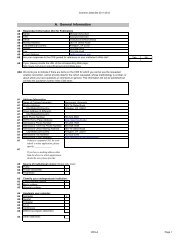Student Handbook - Marymount University
Student Handbook - Marymount University
Student Handbook - Marymount University
You also want an ePaper? Increase the reach of your titles
YUMPU automatically turns print PDFs into web optimized ePapers that Google loves.
When criminal charges are pending, the university may<br />
be delayed from conducting its own investigation and<br />
moving forward with a campus hearing. The university,<br />
in consultation with legal counsel and local authorities,<br />
will determine a period of time that will be considered<br />
a reasonable delay. However, for the good order and<br />
safety of the community, the university will move<br />
forward with its own investigation to determine if a<br />
student is responsible for a policy violation.<br />
Section 4: Special Provisions<br />
A. Attempted Violations<br />
In most instances, <strong>Marymount</strong> <strong>University</strong> will treat<br />
attempts to commit any of the violations listed in the<br />
Community Conduct Code as if those attempts had been<br />
completed.<br />
B. Misconduct Online<br />
<strong>Student</strong>s are cautioned that behavior conducted online,<br />
such as harassment or bullying via email, can subject<br />
them to university conduct action. <strong>Student</strong>s must also<br />
be aware that blogs and web page entries on sites such<br />
as MySpace, Facebook, Twitter and other similar online<br />
postings are in the public sphere and are not private.<br />
These postings can subject a student to allegations<br />
of conduct violations if evidence of policy violations is<br />
posted online. The university does not regularly search<br />
for this information but may take action if and when<br />
such information is brought to the attention of university<br />
officials.<br />
C. <strong>University</strong> as Complainant<br />
<strong>Marymount</strong> <strong>University</strong> reserves the right to initiate<br />
a complaint, to serve as complainant, and to initiate<br />
conduct proceedings without a formal complaint by the<br />
victim of the alleged misconduct.<br />
D. False Reports<br />
<strong>Marymount</strong> <strong>University</strong> will not tolerate intentional false<br />
reporting of incidents. It is a violation of the Community<br />
Conduct Code to make an intentionally false report of<br />
any policy violation and it may also violate state criminal<br />
statutes and civil defamation laws.<br />
E. Group Violations<br />
A student group or organization and its officers<br />
and membership may be held collectively and<br />
9<br />
individually responsible when violations of this code<br />
by the organization or its members take place at<br />
organization-sponsored events, have received the<br />
consent or encouragement of the organization or of<br />
the organization’s leaders or officers, or was known or<br />
reasonably should have been known to the membership<br />
or its officers. Hearings for student groups or<br />
organizations follow the same general student conduct<br />
procedures.<br />
In any such action, individual determinations as to<br />
responsibility will be made and sanctions may be<br />
assigned collectively and individually and will be<br />
proportionate to the involvement of each individual.<br />
F. Parental and Departmental Notification<br />
<strong>Marymount</strong> <strong>University</strong> reserves the right to notify the<br />
parents/guardians of dependent students regarding<br />
any conduct situation, particularly disciplinary probation,<br />
loss of housing, suspension, and expulsion. <strong>Marymount</strong><br />
<strong>University</strong> also reserves the right to designate which<br />
university employees have a legitimate need to know<br />
about individual conduct complaints pursuant to the<br />
Family Educational Rights and Privacy Act (FERPA) and<br />
will share information accordingly.<br />
G. Notification of Outcomes<br />
The outcome of a campus hearing is part of the<br />
education record of the accused student/respondent and<br />
is protected from release under the Federal Education<br />
Rights and Privacy Act (FERPA), except under certain<br />
conditions. In accordance with FERPA, when a student<br />
is accused of a policy violation that would constitute a<br />
“crime of violence” or a forcible or nonforcible sex offense,<br />
upon written request of the victim (or next of kin) the<br />
university will inform the alleged victim/complainant in<br />
writing of the final results of a hearing, regardless of<br />
whether the university concludes that a violation was<br />
committed. Such release of information may only include<br />
the alleged student’s/respondent’s name, the violation<br />
committed and the sanctions assigned (if applicable). In<br />
cases of sex offenses, regardless of written request, the<br />
above information and rationale for the outcome will also<br />
be shared with all parties to the complaint.


